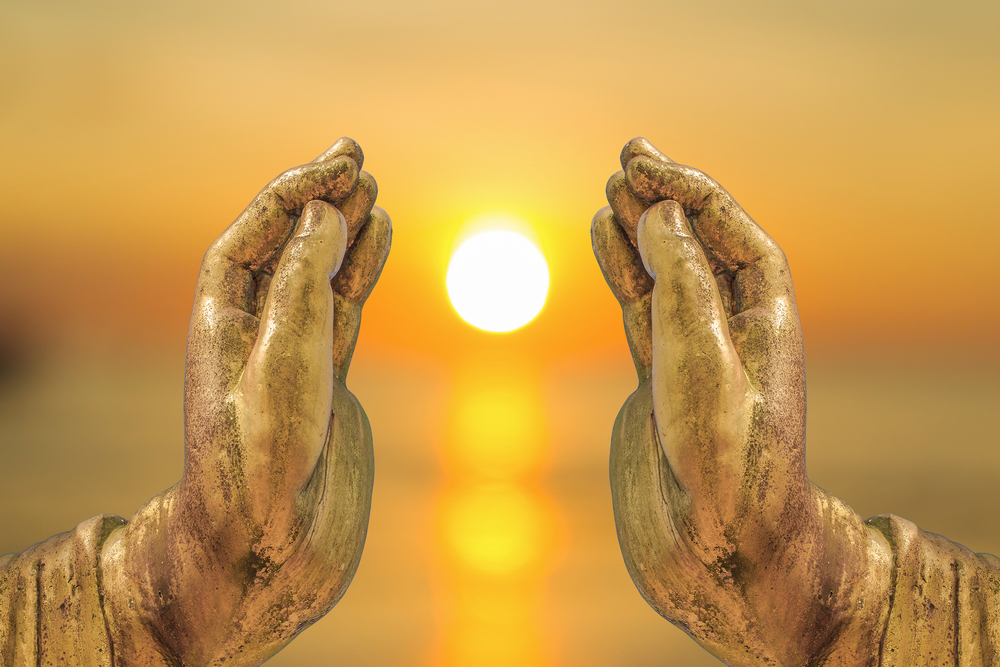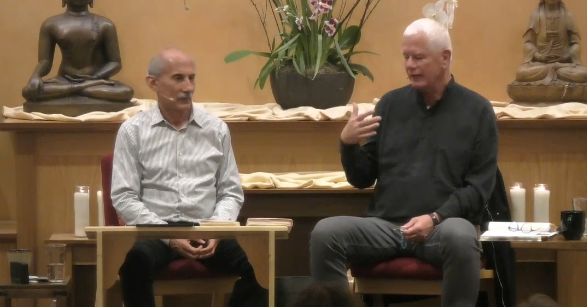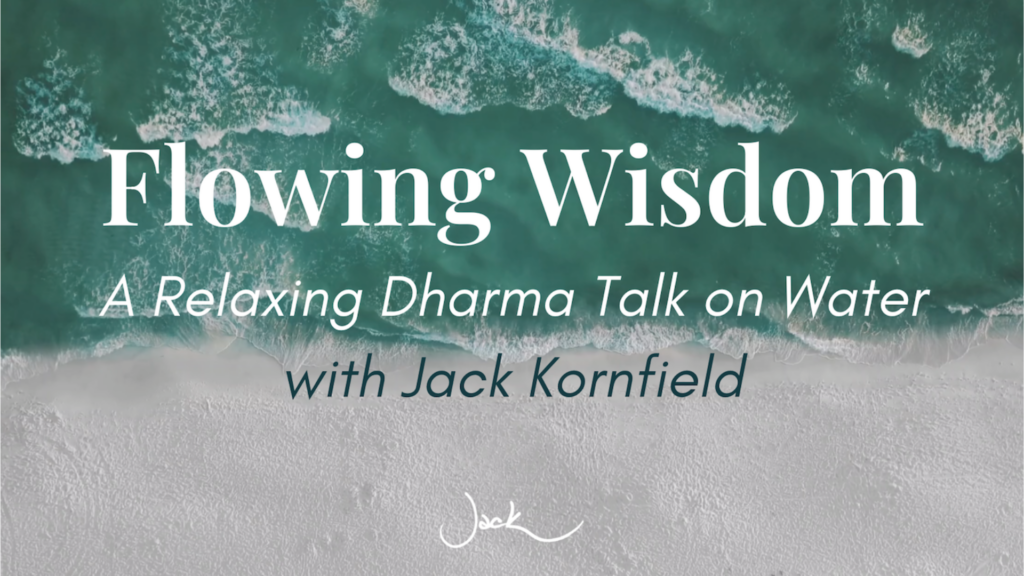Learning takes place only in a mind that is innocent and vulnerable.—Krishnamurti
There are four principles for mindful transformation of difficulties, poetically articulated by Michele McDonald with the acronym RAIN. RAIN stands for Recognition, Acceptance, Investigation, and Non-Indentification. This acronym echoes the Zen poets who tell us “the rain falls equally on all things.” Like the nourishment of outer rain, the inner principles of RAIN can transform our difficulties.
Recognition is the first step of mindfulness. When we are stuck in our life, we must begin with a willingness to see what is so. It is as if someone asks us gently, what is happening now? Do we reply brusquely, “Nothing” or do we pause and acknowledge the reality of our experience, here and now? With recognition we step out of denial. Denial undermines our freedom. The diabetic who denies his body is not free. Neither is the driven, stressed-out executive who denies the cost of her lifestyle, or the self-critical would-be painter who denies his love of making art. The society that denies its poverty and injustice has lost a part of its freedom as well. If we deny our dissatisfaction, our anger, our pain, our ambition, we will suffer. If we deny our values, our beliefs, our longings, or our goodness, we will suffer. “The emergence and blossoming of understanding, love, and intelligence has nothing to do with any outer tradition,” observes Zen teacher Toni Packer. “It happens completely on its own when a human being questions, wonders, listens, and looks without getting stuck in fear. When self-concern is quiet, in abeyance, heaven and earth are open.” With recognition our awareness becomes like the dignified host. We name and inwardly bow to our experience: “Ah, sorrow; and now excitement; hmm, yes, conflict; and yes, tension. Oh, now pain, yes, and now, ah, the judging mind.” Recognition moves us from delusion and ignorance toward freedom. “We can light a lamp in the darkness,” says the Buddha. We can see what is so.
The next step of RAIN is acceptance. Acceptance allows us to relax and open to the facts before us. It is necessary because with recognition, there can come a subtle aversion, a resistance, a wish it weren’t so. Acceptance does not mean that we cannot work to improve things. But just now, this is what is so. In Zen they say, “If you understand, things are just as they are. And if you don’t understand, things are still just as they are.” Acceptance is not passivity. It is a courageous step in the process of transformation. Acceptance is a willing movement of the heart, to include whatever is before it. In individual transformation we have to start with the reality of our own suffering. For social transformation we have to start with the reality of collective suffering, of injustice, racism, greed, and hate. We can only transform the world as we learn to transform ourselves. As Carl Jung comments, “Perhaps I myself am the enemy who must be loved.” With acceptance and respect, problems that seem intractable often become workable. A man began to give large doses of cod-liver oil to his Doberman because he had been told that the stuff was good for dogs. Each day he would hold the head of the protesting dog between his knees, force its jaws open, and pour the liquid down its throat. One day the dog broke loose and the fish oil spilled on the floor. Then, to the man’s great surprise, the dog returned to lick the puddle. That is when the man discovered that what the dog had been fighting was not the oil but his lack of respect in administering it. With acceptance and respect, surprising transformations can occur.
Recognition and acceptance lead to the third step of RAIN, investigation. Zen Master Thich Nhat Hanh calls this “seeing deeply.” In recognition and acceptance we recognize our dilemma and accept the truth of the whole situation. Now we must investigate more fully. Buddhism teaches that whenever we are stuck, it is because we have not looked deeply enough into the nature of the experience. Buddhism systematically directs our investigation to four areas that are critical for understanding and freedom. These are called the four foundations of mindfulness: body, feelings, mind, and dharma, the underlying principles of experience. Here is how we can apply them when working with a difficult experience. Starting with investigation in the body, we mindfully locate where our difficulties are held. Sometimes we find heat, contraction, hardness, or vibration. Sometimes we notice throbbing, numbness, a certain shape or color. We can investigate whether we are meeting this area with resistance or with mindfulness. We notice what happens as we hold these sensations with mindfulness. Do they open? Are there other layers? Is there a center? Do they intensify, move, expand, change, repeat, dissolve, or transform? In the second foundation of mindfulness, we can investigate what feelings are part of this difficulty. Is the primary feeling tone pleasant, unpleasant, or neutral? Are we meeting this feeling with mindfulness? And what are the secondary feelings associated with it? Often we discover a constellation of feelings. A man remembering his divorce may feel sadness, anger, jealously, loss, fear, and loneliness. A woman who was unable to help her addicted nephew can feel longing, aversion, guilt, desire, emptiness, and unworthiness. With mindfulness, each feeling is recognized and accepted. We investigate how each emotion feels, whether it is pleasant or painful, contracted or relaxed, tense or sad. We notice where we feel the emotion in our body and what happens to it as it is held in mindfulness. Next comes the mind. What thoughts and images are associated with this difficulty? What stories, judgments, and beliefs are we holding? When we look more closely, we often discover that some of them are one-sided, fixed points of view, or out-moded, habitual perspectives. We see that they are only stories. They loosen their hold on us. We cling less to them. The fourth foundation to investigate is called mindfulness of the dharma. Dharma is an important and multifaceted word that can mean the teachings and the path of Buddhism. It can mean the truth, and in this case it can also mean the elements and patterns that make up experience. In mindfulness of the dharma we look into the principles and laws that are operating. We can notice if an experience is actually as solid as it appears. Is it unchanging or is it impermanent, moving, shifting, recreating itself? We notice if the difficulty expands or contracts the space in our mind, if it is in our control or if it has its own life. We notice if it is self-constructed. We investigate whether we are clinging to it, resisting it, or simply letting it be. We see whether our relationship to it is a source of suffering or happiness. And finally, we notice how much we identify with it. This leads us to the last step of RAIN, non-identification.
In non-identification we stop taking the experience as me or mine. We see how our identification creates dependence, anxiety, and inauthenticity. In practicing non-identification, we inquire of every state, experience, and story, is this who we really are? We see the tentativeness of this identity. Instead of identification with this difficulty, we let go and rest in awareness itself. This is the culmination of releasing difficulty through RAIN. Buddhism calls non-identification the abode of the awakening, the end of clinging, true peace, nirvana. Without identification, we can live with care, yet we are no longer bound by the fears and illusions of the small sense of self. We see the secret beauty behind all that we meet. Mindfulness and fearless presence bring true protection. When we meet the world with recognition, acceptance, investigation and non-identification, we discover that wherever we are, freedom is possible, just as the rain falls on and nurtures all things equally.
This excerpt is taken from the book Bringing Home the Dharma: Awakening Right Where You Are






